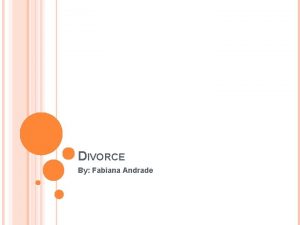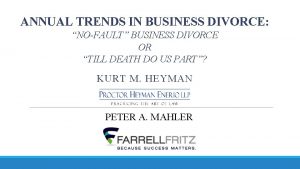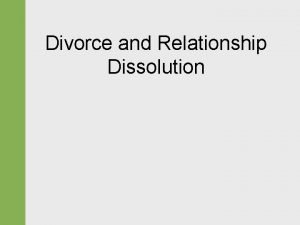Divorce Trends America has the highest divorce rates











- Slides: 11

Divorce

Trends • America has the highest divorce rates in the world going back to 1889 (Coontz, 2006) • At the same time love-marriages became the dominant model (Coontz, 2006) • Divorce rates have stabilized (Martin, 2006) • Most divorces occur early in marriages – 5 years 10% – 15 years 43% – Median 8 years; mean 6. 3

Why Are We Seeing This Trend Economic Factors • Class (edu & family income matter) • Wives in the labor force – Independence effect – Income effect (in low-income families--acts as stabilizer) – The effect of women’s employment on marriage depends on gender ideology High Expectations of Marriage • Political/Economical Contract v. Free-choice – Practical expectations are associated with higher satisfaction

Why Are We Seeing This Trend The Changed Nature of Marriage • Love-Marriage (a worldwide change) • Mortality rates, i. e. , a much longer time together – Self-Fulfilling Prophecy – Shift from Chitchat to Marital Conversation Decreased Social, Legal & Moral Barriers • No-Fault Divorce Laws • Rise in individualistic values • Growing acceptance

Common Marital Complaints (Kitson) Both Sexes 1. Lack of Communication (F, 32% M, 27%) Men 2. Joint Conflict over Roles 21 % 3. Not Sure 18 % (2 % of women) Women Alcohol, untrustworthy and immature, out with the boys

Divorce American Style (Hetherington) Good Marriages & Bad Marriages 1. Pursuer-Distancer 2. Disengaged Marriages 3. Operatic Marriages 4. Cohesive-individuated Marriages 5. Traditional Marriages

Divorce American Style (Hetherington) 1. 70% of Women and Men moved on to build reasonably or exceptionally fulfilling lives 2. 20% of Women emerged enhanced, exhibiting competencies they never would had: gone back to school, economic stability, etc. 3. #1 predictor of subsequent adjustment was new supporting intimate relationship 4. 75 to 60 % Women remarried 5. Child Development (75 to 80% good to very well)

“Stations” of Divorce (Bohannan) 1. Emotional Divorce * rather than reinforce each other, partners undermine each other’s self esteem 2. Legal Divorce * Divorce, like death, requires a period of grieving, but legal divorce is rational * * The Lawyers! Divorce Mediation

Aspects of Divorce 3. Community Divorce * Disruption in social networks 4. Economic Divorce * income-to-needs ratio * motherhood penalty 5. Psychic Divorce * Three Stages 1. 2. 3. Denial Anger & Depression Ex-Spouses take responsibility

Negative Effects on Children 1. Life Stress Perspective (accumulation of negative stressors) 2. Parental Loss Perspective (absence of parent = problems regarding socialization) 3. Parental Adjustment Perspective (custodial parent’s psychological adjustment) 4. Economic Hardship Perspective (varies among social classes) • Interparental Conflict Perspective (conflict between parents before, during & after)

His and Her Divorce • Women – Adherence to traditional gender roles is associated with feelings of lost identity – Labor market issues • Men – Retaining economic obligations without the joy of parenting – Adherence to traditional gender roles is associated with inability to share grief
 Unit rate vocabulary
Unit rate vocabulary Equivalent ratios
Equivalent ratios Ratios rates and unit rates
Ratios rates and unit rates Ratios rates and unit rates
Ratios rates and unit rates Highest mountain range in south america
Highest mountain range in south america Literacy rates in latin america
Literacy rates in latin america Who has the highest h index
Who has the highest h index Higher frequency waves
Higher frequency waves Which wave has the highest frequency?
Which wave has the highest frequency? Which power amplifier has the highest collector efficiency
Which power amplifier has the highest collector efficiency We can do a rap of the map of the us
We can do a rap of the map of the us Countries between south america and africa
Countries between south america and africa





















